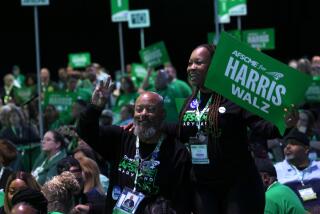Joe Biden’s South Carolina firewall is holding, new poll indicates

Joe Biden’s campaign got good news Thursday, as a new poll added to the evidence that he’s on track to win South Carolina’s presidential primary on Saturday — a victory he desperately needs to keep his flagging campaign alive.
The new survey, from the highly regarded Monmouth University poll, shows Biden with support of 36% of likely Democratic primary voters in the state, ahead of Sen. Bernie Sanders with 16% and Tom Steyer, the billionaire California activist and philanthropist, with 15%. Another 15% of voters remain undecided, and the rest of the candidates drew support in single digits.
Biden has long seen African American voters, who typically make up around 60% of the Democratic electorate in South Carolina, as potential saviors of his campaign. He has had strong support among them, in part because of the goodwill he accumulated through eight years as the vice president to the country’s first African American president. But after defeats in the first three contests — in Iowa, New Hampshire and Nevada — Biden’s allies have worried that black voters would desert him for Sanders or another candidate.
The Monmouth poll indicates that’s not happening. Biden has the support of 45% of African Americans in the survey, ahead of Steyer, who has 17%. Steyer has spent large amounts of money advertising in the state with a message aimed specifically at gathering African American support, including a call for reparations for slavery. Sanders got only 13% of the black voters in the survey.
White voters divided more evenly, with Biden again in the lead, with 26%, followed by Sanders at 17%, Sen. Elizabeth Warren of Massachusetts at 13%, former Mayor Pete Buttigieg of South Bend, Ind., at 13% and Steyer at 12%. Former New York Mayor Michael R. Bloomberg is not on the ballot in the state.
About 4 in 10 of the state’s voters said in the survey that they were firmly decided on their vote. Backers of Biden and Sanders were about equally likely to have made up their minds, while backers of the other candidates remained more tentative.
The remaining undecided voters are mostly black voters who describe themselves as moderates, “a group that tends to like Biden,” Patrick Murray, director of the Monmouth poll, said in a statement.
The poll was conducted Sunday through Tuesday, after Sanders’ victory in the Nevada caucuses, but before two events that most analysts expect will help Biden — Tuesday night’s candidate debate, for which Biden got good reviews, and Wednesday morning’s endorsement by Rep. James E. Clyburn, the leading African American political figure in South Carolina.
Joe Biden picks up a major endorsement and Elizabeth Warren rallies with John Legend as candidates chase the support of black voters in South Carolina.
“Biden appears to be holding on to his core support among African Americans in South Carolina. The recent endorsement by Clyburn should help solidify that,” Murray said.
Democratic voters have divided in this campaign between those who put a priority on a candidate who can unite the country versus those who want a candidate who can bring about change. In South Carolina, however, Biden leads among both groups.
Just over half of likely Democratic primary voters say they want a candidate who can unite the country, while 41% say they prefer a candidate who can bring change. Biden had a edge over Sanders among the voters who put a priority on change, 29% to 20%, with Steyer at 18%. Among those who say the top priority is unifying the county, Biden leads with 43% to 14% for Sanders and 12% for Steyer.
The Monmouth poll was conducted by telephone, using cellphones and landlines, Feb. 23 to 25. It surveyed 713 registered South Carolina voters, of whom 454 are likely to vote in the Democratic primary. The margin of error is 4.6 percentage points in either direction.
More to Read
Get the L.A. Times Politics newsletter
Deeply reported insights into legislation, politics and policy from Sacramento, Washington and beyond. In your inbox three times per week.
You may occasionally receive promotional content from the Los Angeles Times.












